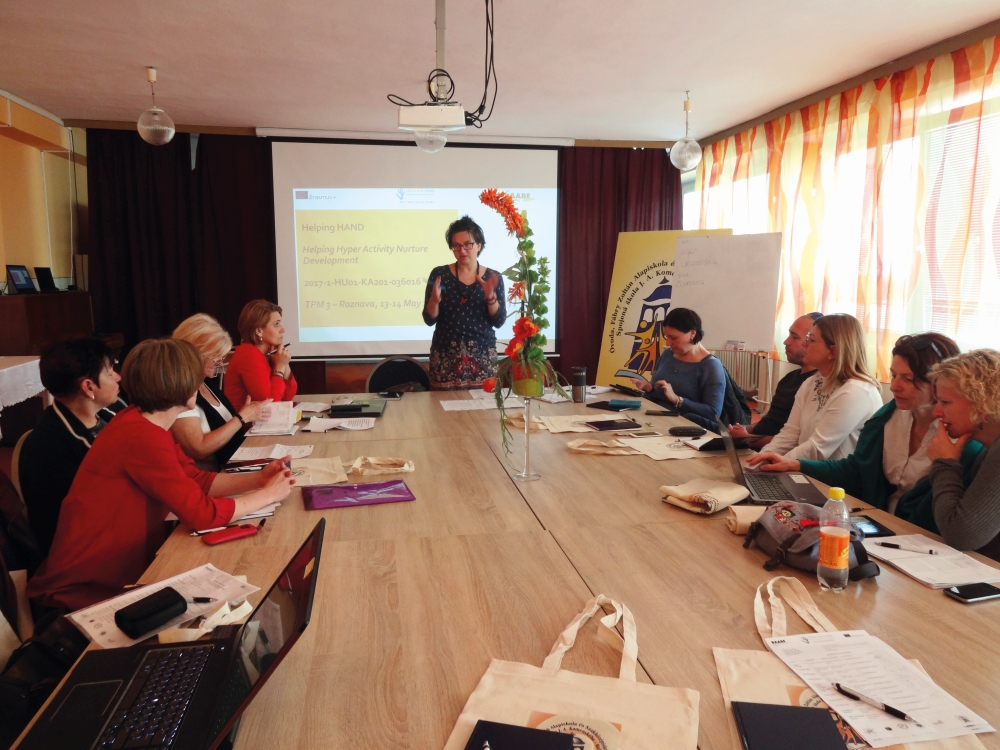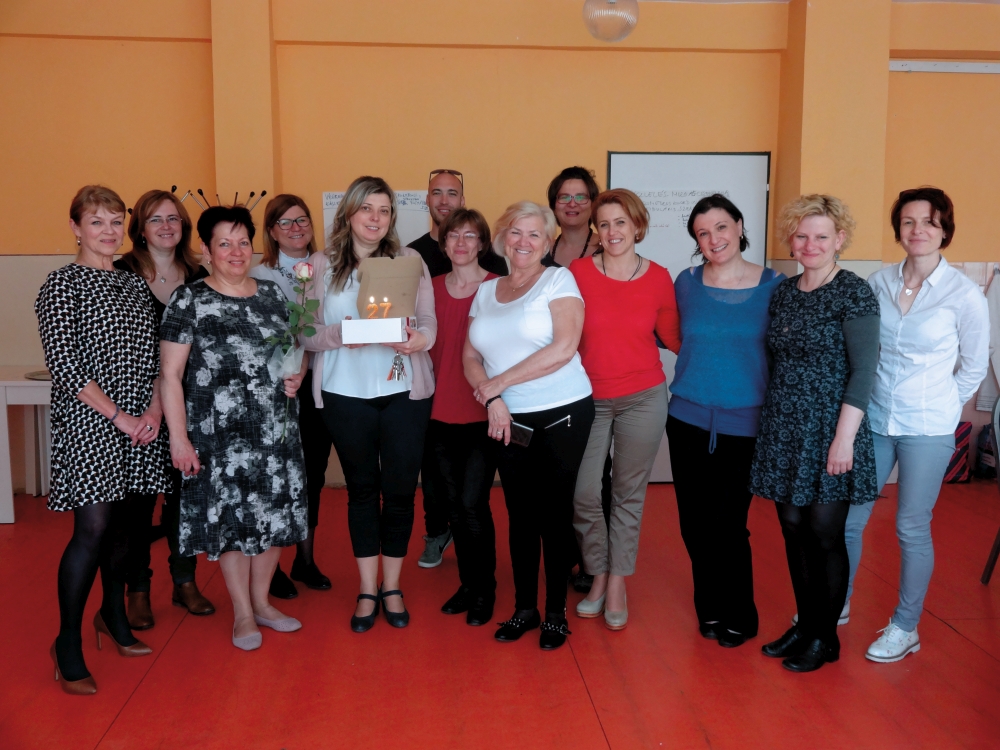
The players of public education: children, teachers and parents are often faced with challenges which may as well require parties outside public education to manage. Raabe Klett Educational Consulting and Publishing Ltd. and its partners were the implementers of a project addressing this field, too. Their partnership and outcomes show how great things can be achieved when professionals from various fields join forces to find a solution. The framework was provided by the Erasmus+ Strategic Partnerships programme for partnerships consisting of various institutions, offering funding for the implementation of educational projects which seek to address any challenge identified in our environment. We talked to Project Manager Zsuzsa Rihay about the project.
Helping kindergarten teachers and parents support children with ADHD
What was the issue identified in public education that motivated the project?
Attention-deficit/hyperactivity disorder (ADHD) is one of the most frequently diagnosed neurodiverse condition of the nervous system, affecting 5-7% of children and young people. According to estimates, some 70,000 children within the Hungarian educational system are affected (and often not diagnosed), which means one child per classroom on average. These children find it hard to control their own behaviour, to pay attention, they have difficulties controlling their emotions, finding friends or establishing positive relationships with adults, and they also struggle with the requirements of conventional educational structures and practices, such as sitting quietly and maintaining prolonged attention. Supporting them and learning with them is a great challenge for both parents and teachers.
You should be aware that their challenging behaviour is not intentional; their difficulties are related to the unusual development of the nervous system - which, unfortunately, teachers often forget, and parents are never told anywhere.
However, ADHD is well manageable; with the right support from the kindergarten, the school and from home, the children can make the most of themselves and become fully fledged members of society. One of the key players in this process is the teacher.
Our project primarily seeks to support them, and provide them with the necessary knowledge and tools to respond effectively to children's social, emotional and/or behavioural development needs. However, we also lay emphasis on parents' role in their children's education and development, and therefore we also want to help them to understand their children's behaviour as well as how they can support their children's development.

What are the products of your project?
During the project, we produced manuals for kindergarten teachers and parents, mainly focusing on the kindergarten age group, which may help them identify ADHD or ADHD-like behaviour and contribute to providing effective support in children's everyday learning environment and at home.
Offering a lot of practical advice and strategies, the manuals ensure the knowledge and skills required for both teachers and parents to be able to cope with the different needs and challenges of the children affected, and teach them positive behavioural patterns.
The emphasis in the manuals is laid on attitude change, a strength based approach, behaviour change strategies and creating an inclusive environment; we also call the attention to the importance of cooperation between those involved.
What special knowledge did your project partners add to the outcomes?
Coventry University and ELTE Bárczi Gusztáv Faculty of Special Needs Education were actively involved in shaping the structure of the manuals, as well as in gathering the most up-to-date scientific achievements and background information, the professional preparation of the focus groups, in the implementation of teacher training courses, ensuring and assessing the quality of the publications, and they also added a research element to the project.
ADHD Hungary Foundation encounters the problems and life situations on a daily basis through the parents and families, so they recommended practical solutions in the parents' manual. Also, as a representative organisation, they can effectively transfer the contents of the manual to the parents and families, and through the families, to the educational institutions.
Our partner kindergartens, that is, the Hajdúböszörmény Affiliate Kindergarten of the University of Debrecen, Spojená škola J. A. Komenského of Rožňava, Slovakia, and Cinderella Association of Cluj-Napoca, Romania, were involved in identifying problems arising in common educational situations, developing and testing the practical tasks, as well as in organising open days for parents and training courses for teachers.
Besides project coordination and organising the events, Raabe Klett Educational Consulting and Publishing Ltd. focused on the practical part prepared for the parents, and it also assumed the duty of editing, illustrating and coordinating the dissemination of the manuals.

What is your long-term goal with the project outcomes?
We definitely want to present the manuals as widely as possible, both among teachers and parents. The existing professional-methodological relations between the kindergartens offer a great opportunity for that. It's a great help for kindergarten teachers to have a manual on the shelf which can support their work, and which, in lack of professionals, can also give advice and support to parents.
In the manuals, we emphasise the importance of cooperation between parents and teachers. We hope that the publications will facilitate the dialogue and bring the parties closer to each other, and thus they can work together to make life easier for the children, the group and the families. We hope the manuals will also facilitate a paradigm shift and sensitisation, so that everybody can understand that these children are not ill-mannered, they only need help, because their different cerebral structures and difficulties affecting their executive functions make it harder for them to meet the requirements of their environment like a neurotypical child. We want the teachers and parents to recognise and understand that by their challenging behaviours, these children often communicate (because they can't do it any other way) that they can't cope with the situation alone. We want this stigma of being ill-mannered removed from them - and their parents.
Although Raabe Klett Educational Consulting and Publishing Ltd. has a similar training course, considering the importance of the issue, we are also planning to launch, and have accredited, a specialised training course for teachers, based on the manuals, as well as to organise and obtain license for an adult training programme for the representatives of the associated professions and the parents.
In autumn 2019, ELTE Bárczi Gusztáv Faculty of Special Needs Education will hold four workshop sessions, based on the manuals, in this subject matter, and plans to integrate the project outcomes in various BA courses.
Besides, we also want the manuals to be included in the recommended literature of kindergarten teacher training institutions, as well as in the National Core Curriculum, currently under development.
| The manuals and electronic publications are available on the project website: http://helping-hand.hu/ Facebook: https://www.facebook.com/HelpingHandErasmus |
Utolsó módosítás: 2020.05.20.












